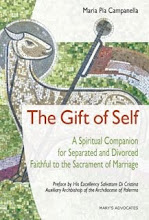I have been reading a little bit of a Fulton J. Sheen book called "Three To Get Married" and it is a truly awesome book. I also found the entire book available for reading on the EWTN website and I will provide the link for that later! I want to share a few excerpts from the book that stood out to me. When you read Fulton J. Sheen's writing you get a sense that he truly understands marriage and has a profound faith in the Catholic Church and it's teaching about marriage. He is truly a very wise man.
A bond is a bond no matter how you try to argue it.
The basis of unity is the fact that in this bond two persons are joined together so as to become "one flesh." This inviolable bond, according to Our Divine Savior, excludes not only desiring another partner but also entering into another union while the partner lives. Our Lord even forbade unlawful desires: "But I tell you that he who casts his eyes on a woman so as to lust after her has already committed adultery with her in his heart." (Matt. 5:28) These words cannot be annulled even by consent of one of the partners, for they express a law of God and nature which no one can break. He directly forbade any remarriage while one bond endured. Even though there might be a legitimate reason for the partners separating, this would not give either one the right to marry again.
Here I love how he puts it into perspective, how can you argue with it?
To say, two years after marriage: "I gave my oath at the altar, yes, but since I am in love with someone else, God would not want me to keep my oath," is like saying: "I promised not to steal my neighbor's chickens, but since I fell in love with that handsome Plymouth Rock, God would not want me to keep my promise."
The unification from the duality of flesh of husband and wife is one of the reasons why the Savior forbade the breaking of the bond. Both men and women, in the moment of the knowing, receive a gift which neither ever knew before, and which they can never know again except by repetition. The resulting psychic changes are as great as the somatic. The woman can never return again to virginity; the man can never return again to ignorance. Something has happened to make them one, and from that oneness comes fidelity, so long as either has a body.
In marriage everything should be ours not mine.
In the happy home there is no such thing as saying: "This is my chair; this is yours." But when love leaves, then comes the lawyer, the division of property, and an equality which kills all love. Genuine love excludes all servility but includes a surrender to the other of the peculiar advantages of each.
As the Scriptures tell us: "The unbelieving husband is sanctified by the believing wife; and the unbelieving wife is sanctified by the believing husband." (1 Cor. 7:14) This is one of the most forgotten texts on the subject of marriage. It applies to the spiritual order the common experiences of the physical. If a husband is ill, the wife will nurse him back to health. In the spiritual order, the one who has faith and love of God will take on the burdens of the unbeliever, such as drunkenness, infidelity, and mental cruelty, for the sake of his soul. What a blood transfusion is to the body, reparation for the sins of another is to the spirit. Instead of separating when there are difficulties and trials, the Christian solution is to bear the other as a cross for the sake of his sanctification. The wife can redeem the husband, and the husband the wife.
Again the bond is simply unbreakable by man no matter how difficult things appear to be.
The key to the solution of crosses of married life, if they come, is not in the breaking of the bond, for that is unbreakable. Rather, it is the utilization of its sufferings for self, for children, and for the spouse, who for the present at least is the cause of the suffering.
The noblest love of a spouse can be exposed to the negation of love, because if love is not returned by the other spouse, it is no reason for abandoning love altogether. When a husband gives up an unloving wife, or an unloving wife gives up an unloving husband, there is a denunciation of love in the universe, a betrayal of the Love of God Who loved us even while we were sinners.
Nothing can justify breaking the bond!
Because the Christian marriage is the fleshly symbol of the Divine Espousals of Christ and His Bride the Church, no infidelity or unworthiness can justify the breaking of the bond for the sake of contracting a new marriage. Separation may be allowed; but, even then, the faithful one must be redemptive of the other. Faithfulness to the bond is here not to be interpreted as a passive resignation to a duty. It is not the nature of love ever to abandon the one in moral need, any more than it is the nature of a mother's love to abandon a child with polio.
This one really touched my heart and it is one I will be living by.
The "believing wife" or the "believing husband," whichever the case may be, refuses entreaties to another marriage (while the spouse is living) not for the negative reason, "The Church will not allow me," but for the positive reason, because "I love in a Christian way." Each refusal is a deepening of the first love! Fidelity in crisis is therefore not something one "puts up with" or "makes the best of"; it is something that is ardently chosen for love's sake.
No person in all the world is made happier by the breaking of a pledged love.
Since marital love is the shadow cast on earth by the love of Christ for His Church, then it must have Christ's redemptive quality. As Christ delivered Himself up for His Spouse, so there will be some wives and some husbands who will deliver themselves up to Golgotha for the sake of their spouses. The young suitor does not abandon his beloved because she falls in the mud. Why then, when there is moral dirt into which she tumbles, should the husband claim that love does not demand the rescue?
As you can see Fulton J. Sheen is very passionate in his writing. It is very moving. If you want to read more of "Three To Get Married" you can read it online at the EWTN link below:
http://www.ewtn.com/library/MARRIAGE/3GETMARR.TXT
If you want to buy the actual book you can click the picture of the book off to the side of the blog. Enjoy!
Friday, March 6, 2009
Subscribe to:
Post Comments (Atom)




















steroid satın al
ReplyDeleteheets
Q4TN
şırnak
ReplyDeletesivas
tekirdağ
tokat
trabzon
7HG